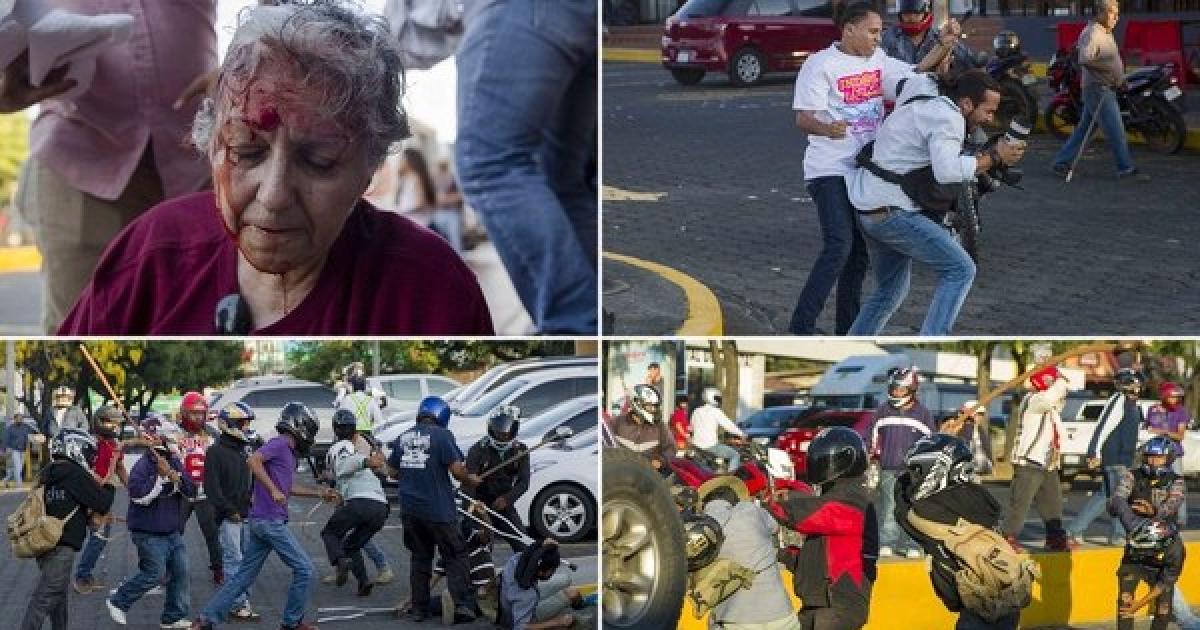Military intervention, free and protect the people, we want democracy
people signed. Let's get to 1,000!

Addressed to: United Nations and 2 more
Nicaragua lived on Monday one of the most violent days since the beginning of the crisis, in April, when the demonstrations against President Daniel Ortega began. Yesterday's clashes between students, riot police and vigilante groups left at least one person dead and more than 20 wounded, a pro-government radio station set on fire and attacks on journalists, including a team from the EFE agency that covered the riots. These began in the morning, when a group of students announced that they had taken in protest the National University of Engineering (UNI), an important center of studies until now controlled by the government of President Ortega.
The response of the Executive was brutal. He ordered to besiege the campus and burst the entrenchment of the rebellious university students, who responded with handcrafted bombs and stones. In the afternoon, while the hospitals treated the wounded, the Sandinista leader announced that he was willing to resume negotiations to find a solution to the crisis, but without complying with the cessation of repression, one of the demands of the Episcopal Conference of Nicaragua (CEN), mediator of the process.
This Central American country completed 41 days of protests and violence, which have left more than 70 people dead. The demonstrations began on April 18, after Ortega imposed a Social Security reform without consensus. The president fiercely repressed the protests. The bloodiest days of the repression were on April 19, 20 and 21, with scores of young people killed. Many of them died from bullet wounds received in the head, neck or chest.
The Inter-American Commission on Human Rights (IACHR), after a visit to Nicaragua to learn about the human rights situation, stated in its report that it received allegations that snipers were used in the repression, which opened up the possibility of extrajudicial executions. He also denounced the use of vigilante groups to suppress demonstrations.
The violence on Monday affected the business center of Managua, the capital, where the UNI and Jesuit Central American University campuses are located, which had already been attacked on Sunday night. Up to this capital area were sent riot officers, who were used harshly to quell the clashes: videos transmitted through social networks show officers riding in trucks and firing. It is one of the most active areas of the capital, where tens of thousands of citizens converge every day and is full of shops, banks, bars and restaurants.
The riot police assaulted journalists who had taken refuge in a gas station in the area. The journalists reported that the officers fired on the premises. Meanwhile, the Efe agency reported that its team, made up of photographer Jorge Torres and cameraman Reneé Lucía Ramos, were assaulted while covering the violence. "When the police started firing bullets and rubber bullets at the demonstrators, Efe Agency professionals covered themselves behind the tires of a parked car, but two agents who discovered them demanded that they join the cry" that hijueputas arise! " while they kicked and shook them, "the agency said in a statement. In one of the videos that circulated on social networks, Efe's camera begs the riot police while he shouts that he is a journalist. "Justice! Justice! "The reporter cries desperately.
Hours earlier, the entrance to Radio Ya, a pro-government station, was burned down, from which the government criticizes the demonstrators, calling them "vandals" and "coup leaders". The radio station was burned down according to a statement by the National Police for "delinquents", although the authorities did not give more details of what happened in the media. The fire could be extinguished in time, without any damage to equipment or personnel of the station.
The majority of the injured were treated in private hospitals, given the fear of the students to be transferred to public attention centers. Gerardo Morales, 24, died at the Baptist Hospital. At that medical center, dozens of injured people were treated on Monday night.
While Managua lived scenes of chaos, the Government announced that it was willing to resume negotiations to find a way out of the political crisis, which in addition to the dozens of deaths and hundreds of wounded, begins to hit the fragile Nicaraguan economy.
The government, however, asked the so-called Civic Alliance that participates in the negotiations - formed by students, representatives of civil society, businessmen and academics - to make a public call for the lifting of roadblocks that two weeks ago they remain in important points of Nicaragua. The negotiations were suspended last week, after the Executive's intransigence to discuss the reforms to recover the country's institutions. It remains to be seen how far the president is willing to yield, besieged by massive demonstrations demanding the end of eleven years of authoritarian rule.
SIGN AND SHARE THIS PETITION
The content of the petitions and the opinions expressed here are the sole responsibility of the author.
